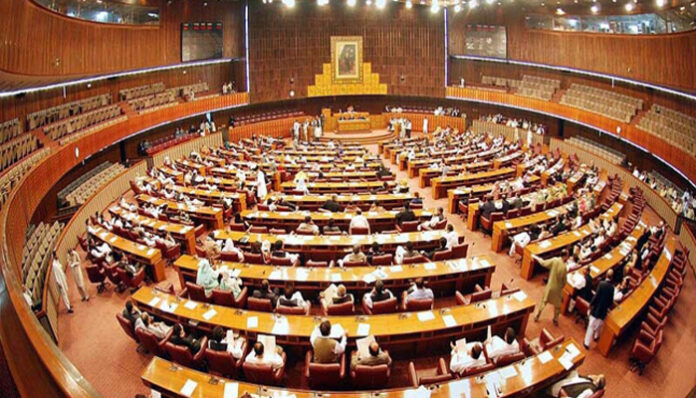— Power Division asked to take up tariff issue with ECC
— Textile millers to observe strike on Feb 10 if issues remain unresolved
ISLAMABAD: The National Assembly’s Standing Committee on Finance and Revenue was informed on Tuesday that the power division was planning to recover up to Rs80 billion arrears from the export sector despite serious reservations by the exporters.
The power division last month had written a letter to export-oriented sector regarding the inclusion of taxes, surcharges and positive fuel adjustment in the industrial tariff.
The committee, chaired by with MNA Faizullah, was further informed that the inclusion of surcharges was a violation of the Economic Coordination Committee’s decision.
Speaking on the occasion, PML-N MNA Ali Parvez Malik alleged that the government wanted to improve its performance by withdrawing facilities already given to the export sector.
“The export sector will be completely closed in case the taxes remain imposed on the sector,” he feared.
The committee chairman showed his displeasure over the absence of officials from the power division and said the issue would be taken up with Prime Minister Imran Khan, who had wished for an increase in exports.
Officials from the finance and commerce ministries claimed they had nothing to do with the gas and electricity tariff and that it was the domain of the power division and NEPRA.
The textile industry had earlier informed the committee that it had urged the MoC to submit an urgent summary to ECC, requesting the implementation of SRO 12 (of January 1, 2019) and withdrawal of the power division’s letter (January 13, 2020) that had asked for inclusion of taxes, surcharges and positive fuel adjustment in the industrial tariff.
The letter stated that the export-oriented sector would be exposed to the inclusion of taxes, surcharges and increase in tariff because of fuel adjustment in the billing.
The initiative could swell electricity price from Rs11.70 per unit to Rs20 per unit for industrial sector. Before the new initiative, the financial cost surcharge, Neelum-Jhelum surcharge, taxes, fixed charges and positive fuel adjustment were not part of the tariff set by the PTI government for export-oriented sectors.
Acting FBR Chairman Nosheen Javed told the committee that levy of tariff on electricity fell under the purview of the Ministry of Energy (Power Division).
After threadbare discussion, Power Purchase Agency Chief Executive Officer Abid Lodhi briefed the committee about the imposition of tariff charges. However, the parliamentary committee expressed its dissatisfaction over the MoE’s response, unanimously directing the ministry to take the matter of electricity tariff to ECC for future implementation.
The stakeholders from export industry, local industry and traders had raised their concerns over imposition of electricity tariff.
STRIKE ON FEB 10
A representative of All Pakistan Textile Mills Association (APTMA) told the committee that the textile sector would be observing strike on February 10 in case the issue remained unresolved.
The NA’s committee also discussed the problems being faced by the exporters due to delay in release of income tax refunds by FBR.
The FBR’s acting chairman informed that the bureau had frequently issued income tax refunds and there were no hurdles at all. However, she suggested that a committee of exporters might be constituted to discuss and resolve the technical issues of Form “H” with the bureau.
The chair asked the exporters to give nominations in this regard following which the exporters and industrialists announced the names for the committee including Pakistan Textile Exporters Association (PTEA) Chairman Sohail Pasha, Hafeez Pasha and Khurram Tariq.
The Faisalabad-based traders informed the committee about the hurdles they were facing in obtaining CNIC copies from the buyer. They were of the view that the said condition had destroyed businesses throughout the country. The FBR chief clarified the traders about asking for CNIC.
FBR’s Member Inland Revenue Hamid Atique Sarwar informed the committee that out of Rs8 trillion share of traders in the national economy, their share of taxes was mere Rs16 billion.
“The objective of CNIC condition is to assess the value of sales as no trader wants to share his real sale value. There are only 350,000 traders in the tax net,” he said.
The committee appreciated the FBR’s role and directed its chief to resolve the CNIC issue in consultation with the traders.
On the direction of the parliamentary committee, the traders also constituted a committee for resolution of their issues with FBR.




